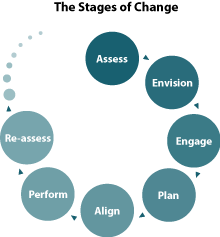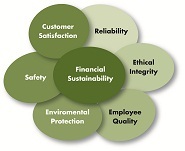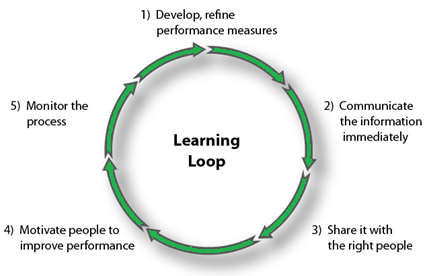
In the years since it was founded in 1973, the Sacramento Natural Foods Co-op has blossomed into a $15 million business. With 7,000 member-owners, it is the second-largest single-store grocery cooperative in the nation in terms of sales and volume. However, when a vocal minority of its democratic membership quashed plans to expand to a second store, the business was at a crossroads.
“There was no way to move forward until we could build consensus around a plan for the future of this organization,” said Paul Cultrera, general manager.
“Things were so bad,” said then board of directors member Peter Keat, “that we literally felt paralyzed as an organization.”
With tensions running high, Cultrera interviewed Eric Douglas of Leading Resources Inc. (LRI). Cultrera was impressed by Douglas’ track record for managing change and gaining consensus within large organizations. “I was looking for someone with really good communication skills,” Cultrera said. “Someone skilled at working with diverse constituencies.”
D2K: Establishing Trust as a Foundation for Long-term Growth
Together Douglas and Cultrera mapped out a five-stage process they called “Directions 2000” or “D2K.” The process was carefully crafted to engage as many member-owners as possible in a productive dialogue with management and each other. At each stage of the process, Douglas guided the participants toward an understanding of the complex business issues under consideration while improving their communication and problem-solving skills. Because the issues were complex, and emotions were running high around the issue of expansion, flexibility had to be at the heart of the process itself.
“Eric has experience working with large, fractured groups, so he was able to bring people together in a constructive manner,” Cultrera said. “As we got into the process and realized that changes needed to be made, he was flexible. He didn’t have a tremendous amount of ego tied up in his own process.”
Stage 1: Identifying Basic Values
 The guiding force behind any effective strategic plan is a clearly articulated set of values and a strong vision. But with member-owners representing a broad demographic spectrum, getting their agreement on a common vision was extremely challenging. Douglas and LRI consultants addressed the challenge by organizing 13 focus groups – 200 people representing specific constituencies such as top shoppers, most active owners and staff – to brainstorm about values and vision.
The guiding force behind any effective strategic plan is a clearly articulated set of values and a strong vision. But with member-owners representing a broad demographic spectrum, getting their agreement on a common vision was extremely challenging. Douglas and LRI consultants addressed the challenge by organizing 13 focus groups – 200 people representing specific constituencies such as top shoppers, most active owners and staff – to brainstorm about values and vision.
“I sat through all 13 of these ‘listening’ sessions and hardly said a word,” Cultrera said. “Eric facilitated them tightly, to the extent that there was a program – but loosely, to the extent that people were able to express themselves very freely. It took me out of it, so there wasn’t this perception of the general manager pushing this thing where he wants it to go.”
Stage 2: Casting a Wider Net
Using input from the focus groups, LRI drafted a survey with 50 questions about values and visions and distributed it to all 7,000 Co-op member-owners. LRI’s analysis of the 1,645 returned surveys confirmed that pricing was most important to members. Member-owners were evenly divided on the question of whether to expand to additional locations. A third issue that came into focus from the survey was the 5% member-owner discount: Owners did not want to give it up, even if it meant they paid higher prices in the store.
Stage 3: Moving Beyond Conflict to Strategy
With the survey data in hand, a group of 25 people – comprised of 15 member-owners, seven members of the Board of Directors and three members of management – began working together as the D2K Planning Team under the guidance of LRI consultants.
Within a few weeks, the team had defined the purpose and values – what Douglas calls the “strategic foundation.” The team then faced the question of vision – and the deep conflict over whether or not the Co-op should expand to a second store.
As a first step, Douglas broke the drafting committee into two teams to generate deeper discussion. The resulting dialogue between the teams ultimately led to a draft vision that called for the Co-op to extend its services “to as many people as possible in the communities we serve.”
“This vision was based on a philosophy of inclusion,” said Keat who was a Planning Team member. “The Co-op offers something very special in the quality of its products, its support for local farmers, and its reliance on cooperative economic principles. Our vision was to share that.”
“We tested this vision again and again within the Planning Team,” Douglas said. As they grew more comfortable, team members used a combination of brainstorming exercises, management input and survey feedback to develop seven key goals to achieve the vision. LRI consultants carefully translated their decisions into a draft strategic plan.
Stage 4: Honoring the Process through Feedback
 The next step was presenting the draft plan to member-owners. Rather than ask for “thumbs up or thumbs down,” LRI created a survey asking member-owners to rate each component of the plan, as well as the process itself. Member-owners were also invited to attend “town hall” forums to discuss the draft and provide feedback.
The next step was presenting the draft plan to member-owners. Rather than ask for “thumbs up or thumbs down,” LRI created a survey asking member-owners to rate each component of the plan, as well as the process itself. Member-owners were also invited to attend “town hall” forums to discuss the draft and provide feedback.
The resulting feedback was overwhelmingly positive. More than 95% of those responding said they supported the process. More than 90% said they supported the vision.
“Based on our previous experience, I thought we might get 55% in favor and 45% opposed. And then we’d be stuck where we were at the beginning,” Cultrera admitted.”Instead, we got a very high approval rating of each individual piece of the plan.”
Even more surprising: “Many of the member-owners who approved the plan had only been touched tangentially by the process – through taking the survey or reading about it in the Co-op’s newsletter,” Douglas said. “But because they had been touched, they supported the change.”
Stage 5: From Approval to Action
After unanimously voting to approve the plan, the Board handed it over to management to implement. “It makes my job as general manager a whole lot easier,” Cultrera said.
“Now, when we run into pockets of controversy or resistance, it’s very easy to say, ‘Well, thank you. I really appreciate your input. But we heard from a lot of people who said this is what they want us to do.’ I feel like when there are other issues we need to face on a nitty-gritty level, we can call that process up again.”
Roadmap to the Future: From Plan to Action
That opportunity was right around the corner. Fresh from the D2K victory, the Co-op again hired LRI to implement one of the plan’s key initiatives. This was the hot button issue of deciding whether to keep or modify the 5% member-owner discount.
True to the D2K process model, Douglas and Cultrera ensured a high level of member-owner involvement at every stage.
They convened a half-dozen “focus groups” to educate member-owners about the impacts of the discount. As with D2K, a Planning Team representing a broad spectrum of viewpoints was selected by LRI to explore alternatives and make a recommendation to the Board.
“At that point, we ran up against the fact that grocery store finance is not easy,” said Douglas. “Yet the team had to learn it in order to make a cogent decision.” For example, the Co-op marked up prices for most items beyond the normal operating markup to support the 5% member-owner discount. This meant higher prices throughout the store and placed the Co-op at a competitive disadvantage with other natural food store chains in the market.
“There were lots of questions and concerns,” said Barbara Mendenhall, Board president. “Eric finally broke us into small groups and asked us to answer three questions:
‘Is there a problem that needs to be fixed?’ ‘What would you propose as an alternative to the discount?’ and ‘What additional information do you need?’
All of the groups came back and said yes, there is a problem. It needs to be fixed. And here’s what we think the new benefits package should be. The amazing thing was – we all proposed the exact same solution!”
As team members became convinced of the wisdom of changing to the discount structure, some wanted to survey member-owners about the alternatives they were considering. “But a new survey would only confirm what the earlier survey told us,” Douglas said. “Without going through the education process, people would resist giving up the discount.” The team finally agreed to stage a series of forums that would bring member-owners from the Planning Team face to face with fellow member-owners still skeptical about making a change.
It was a critical part of the process that Mendenhall calls “transformative.”
“One planning team member really turned the group around just on the force of her own presentation,” Mendenhall said. “As she talked about what she and the group had gone through, you’d start to see heads nod. You could see she felt it from the heart.”
With positive feedback from member-owners, the Board approved changes to an end-of-the-year patronage refund that has worked well at a number of co-ops throughout the country, combined with special pricing programs such as monthly category specials. Some of the original benefits – such as a 10% discount on Owner Appreciation Days – remained in force.
Moving Ahead with Confidence
“We’ve learned that there are a variety of ways to involve members in decision-making, besides just sending everything out for a member vote,” said Mendenhall. “Communication and cooperative education are very important.”
Cultrera agrees. “Because we kept the lines of communication open with the ownership throughout this long process, we heard from people we had never heard from before. By the end of it, member-owners clearly honored the process, so they trusted the plan. It’s given the organization a tremendous amount of strength and ability to keep moving forward.”
The bottom line:
The Co-op’s annual sales increased to $17 million. Its employees had received an across-the-board pay increase reflecting the plan’s commitment to a quality workplace. Meanwhile, the Co-op had begun looking at new locations for a second store, this time with the clear support of its owners.
We hope you enjoyed this organizational development case study. To schedule an initial meeting with LRI, please contact us online or call 1-800-598-7662.
 Client Member Area
Client Member Area 






